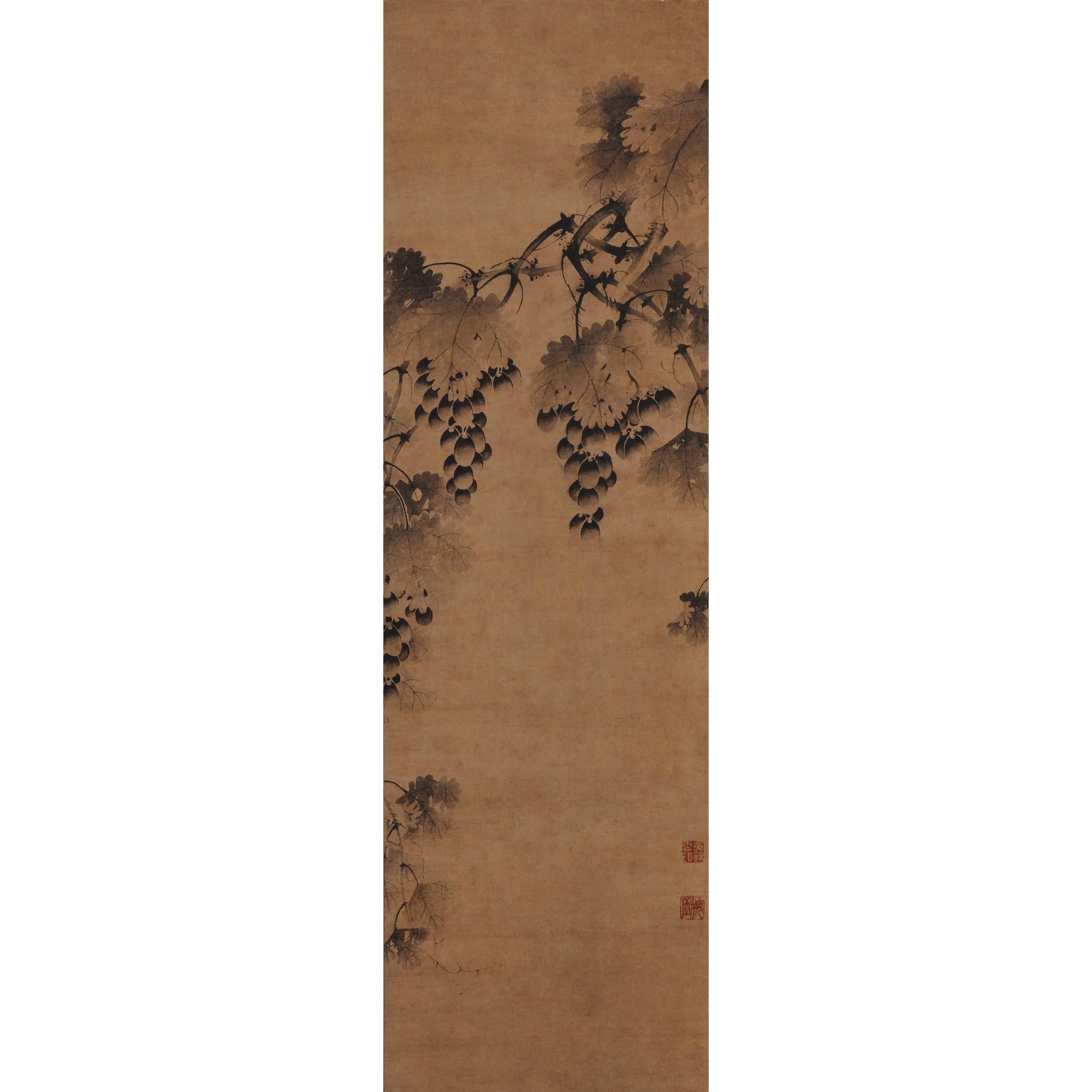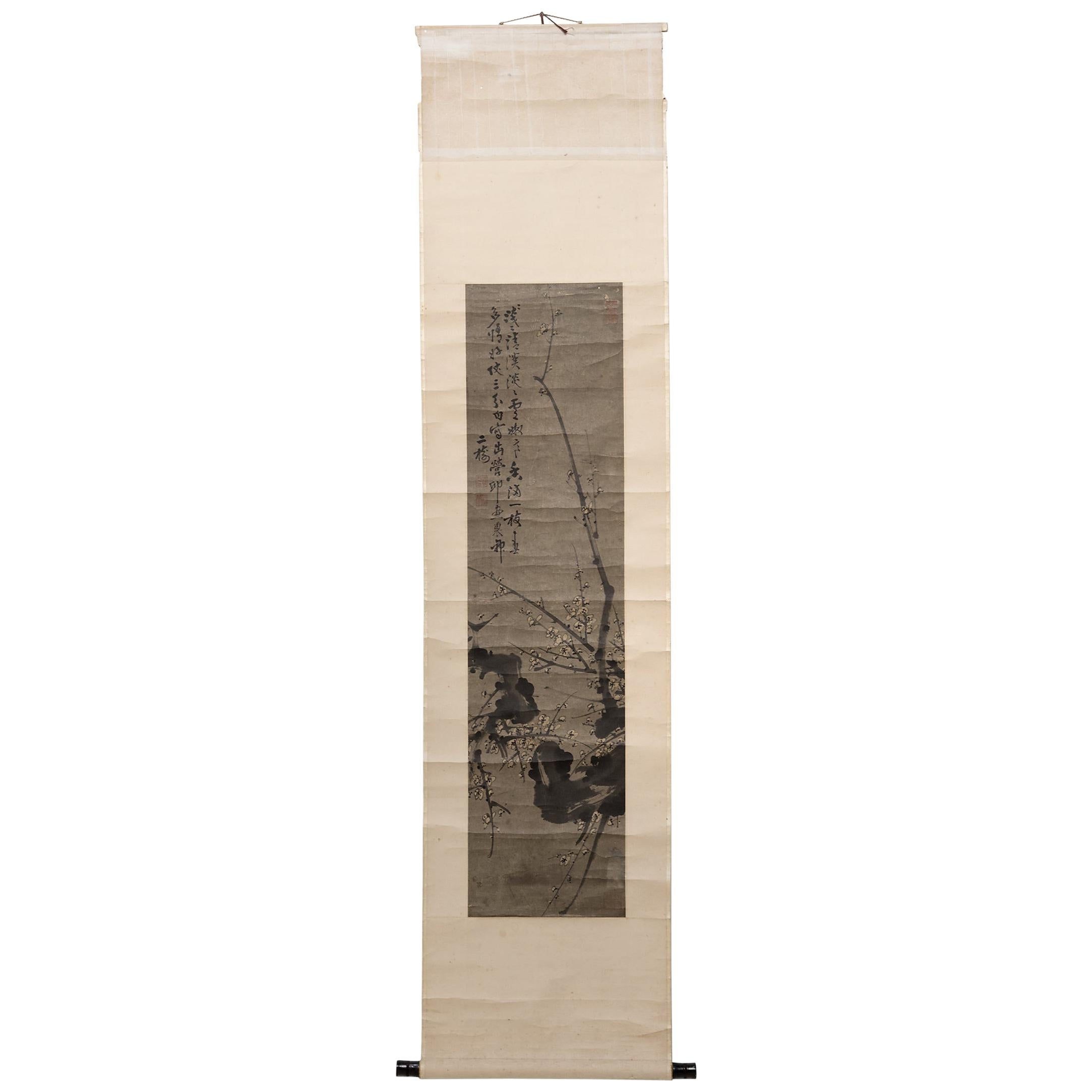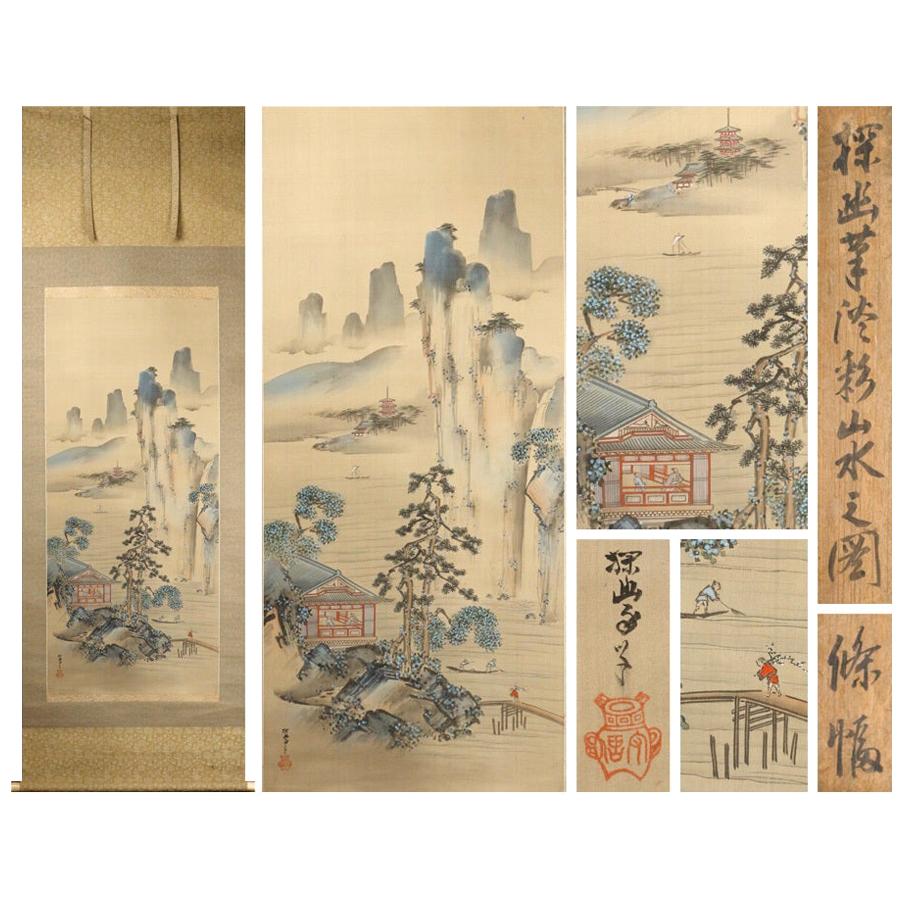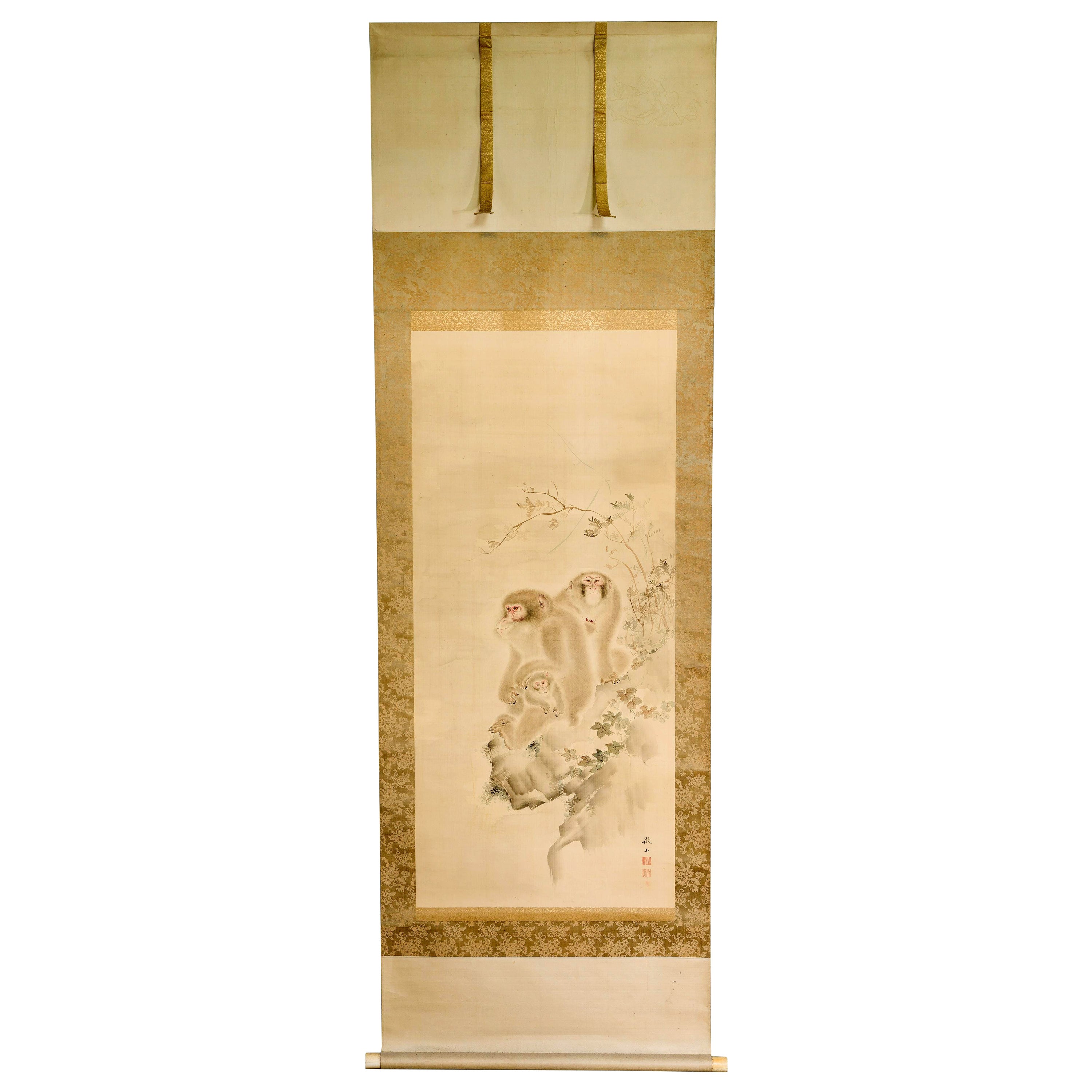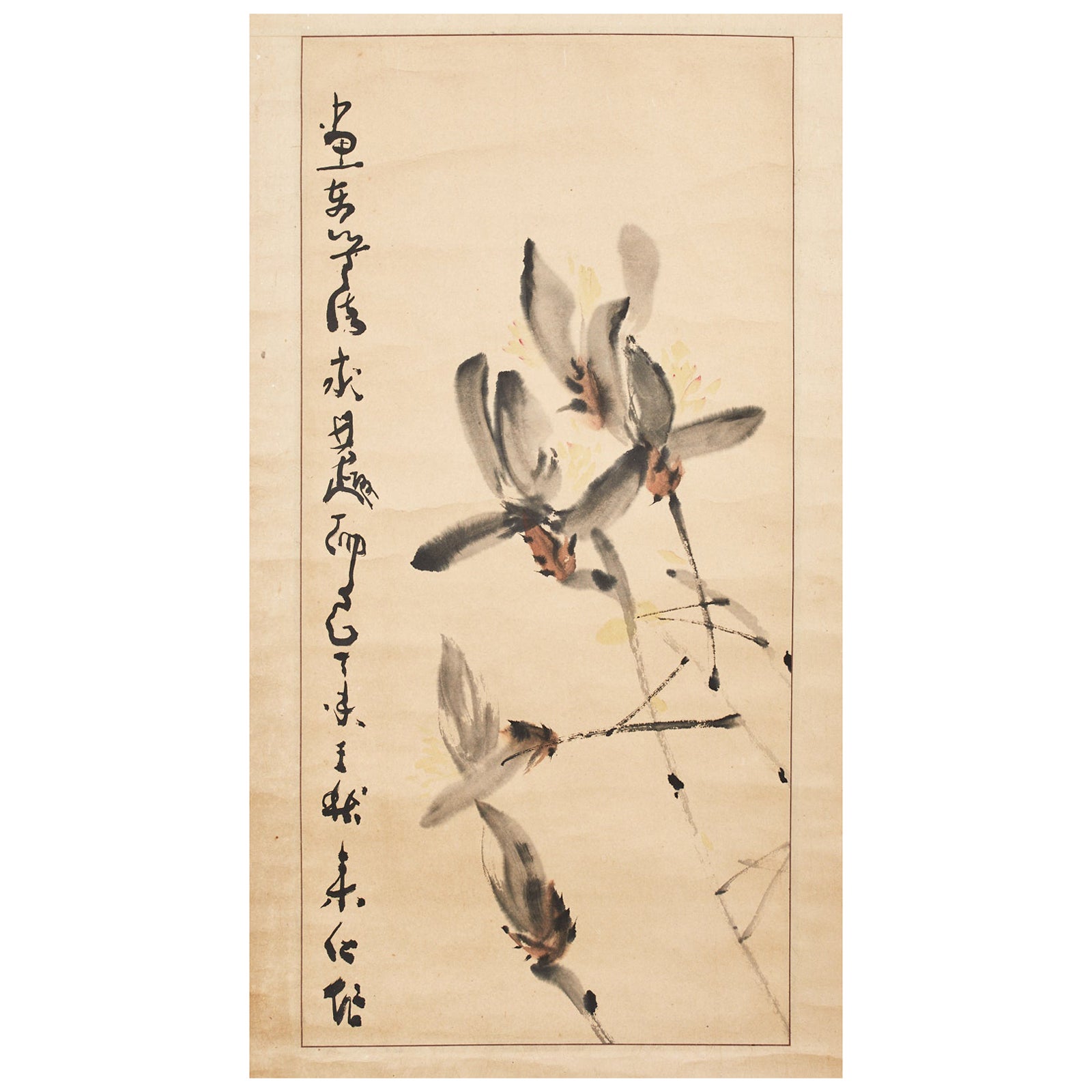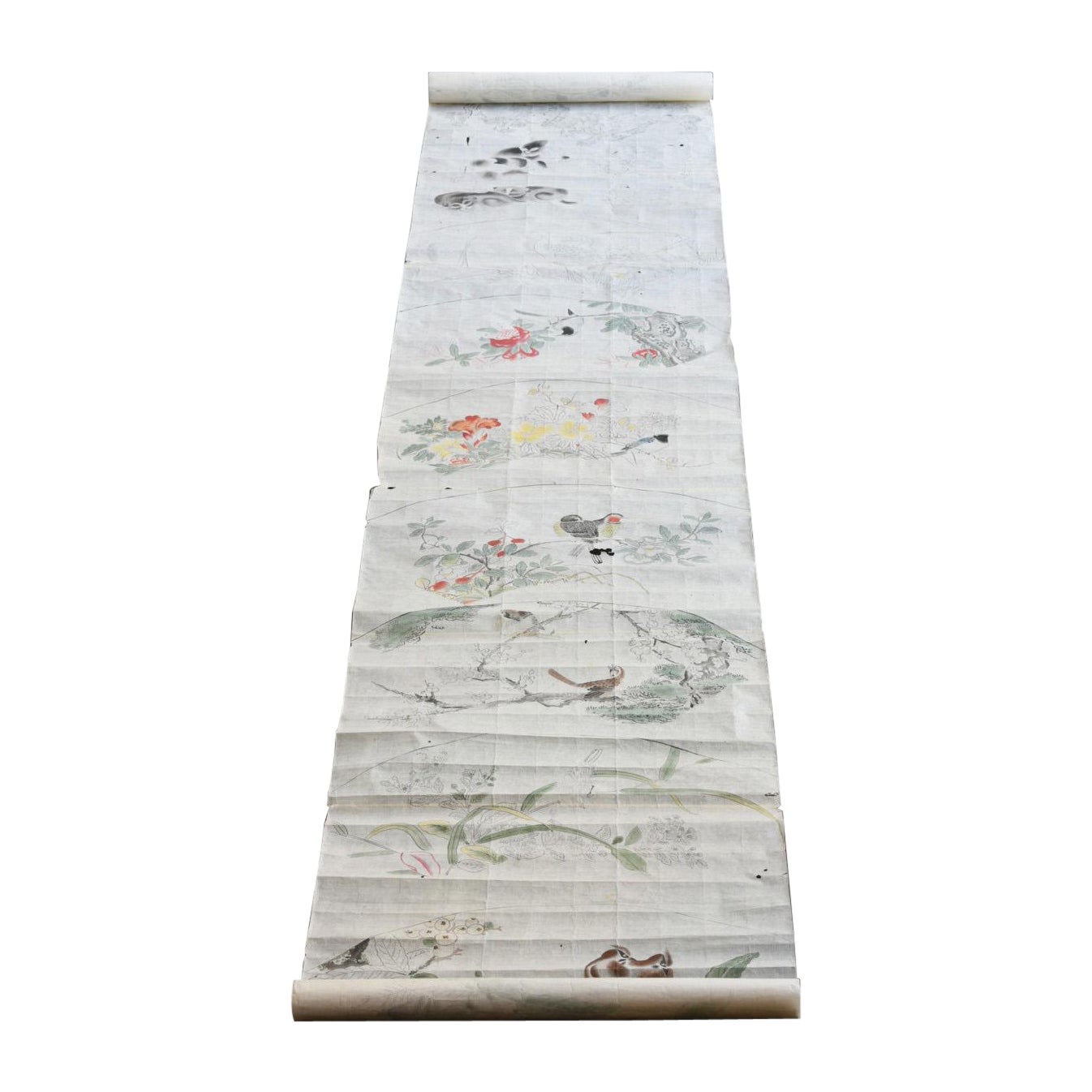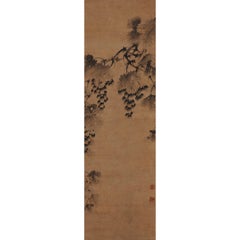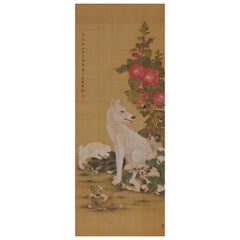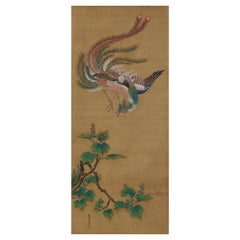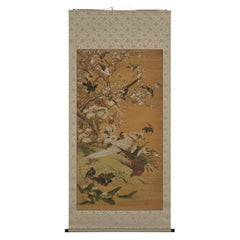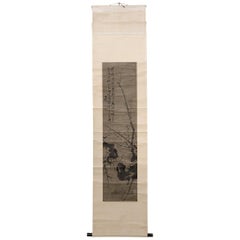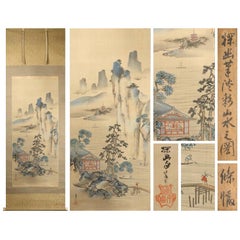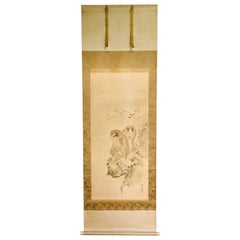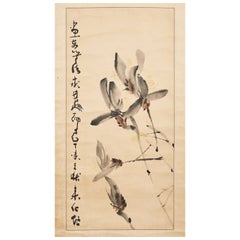Items Similar to 17th Century Korean Grapevine and Squirrel Scroll Painting, Mid Joseon Period
Want more images or videos?
Request additional images or videos from the seller
1 of 12
17th Century Korean Grapevine and Squirrel Scroll Painting, Mid Joseon Period
$18,000
£13,573.79
€15,698.74
CA$25,253.90
A$28,071.28
CHF 14,714.36
MX$342,818.29
NOK 183,700.36
SEK 172,827.77
DKK 117,170.80
About the Item
Anonymous. Korean, 17th century. Joseon period.
Hanging scroll. Ink on paper.
Seal: Shinso
Dimensions:
Scroll: H. 200 cm x W. 31 cm (79” x 12”)
Image: H. 122 cm x W. 29.5 cm (48” x 11.5”)
The grapevine came to China and then Korea from western Asia via the silk road trade routes. By the mid-Joseon period, it was one of the most popular subjects for Korean literati painters. Grapevines were painted as a singular subject or, less commonly, in combination with squirrels, which are associated with children due to their playful nature. Together, grapevines and squirrels embody wishes for abundant offspring and wealth.
For the Korean literati artist the twisting vines, curling tendrils and round, plump grapes provided ample opportunity for expressive "brush play”. In this painting the artist has abstracted the scene and is seemingly unconcerned with discontinuities and proportion. Vines spring up from nowhere, grapes hang in random clusters and the squirrel’s head appears as if twisted backwards. For the vines and leaves we can feel a sense of speed in the brushstrokes, imparting a dynamic feel which is at once intense and animated. This contrasts dramatically with the countless tiny strokes of ink which realistically capture the texture of the squirrel’s fur.
The painting has recently been restored and remounted in Japan (where it was discovered). At some stage during the Edo period it was mounted in Japan in the style of a tea-ceremony scroll. We have retained this brocade and mounting style.
- Dimensions:Height: 79 in (200.66 cm)Width: 12 in (30.48 cm)Depth: 1 in (2.54 cm)
- Style:Other (In the Style Of)
- Materials and Techniques:
- Place of Origin:
- Period:
- Date of Manufacture:circa 1650
- Condition:Refinished. Wear consistent with age and use. The painting has recently been restored and remounted in Japan.
- Seller Location:Kyoto, JP
- Reference Number:1stDibs: LU2472321435382
About the Seller
5.0
Recognized Seller
These prestigious sellers are industry leaders and represent the highest echelon for item quality and design.
Established in 2001
1stDibs seller since 2016
71 sales on 1stDibs
Typical response time: 7 hours
- ShippingRetrieving quote...Shipping from: Kyoto, Japan
- Return Policy
Authenticity Guarantee
In the unlikely event there’s an issue with an item’s authenticity, contact us within 1 year for a full refund. DetailsMoney-Back Guarantee
If your item is not as described, is damaged in transit, or does not arrive, contact us within 7 days for a full refund. Details24-Hour Cancellation
You have a 24-hour grace period in which to reconsider your purchase, with no questions asked.Vetted Professional Sellers
Our world-class sellers must adhere to strict standards for service and quality, maintaining the integrity of our listings.Price-Match Guarantee
If you find that a seller listed the same item for a lower price elsewhere, we’ll match it.Trusted Global Delivery
Our best-in-class carrier network provides specialized shipping options worldwide, including custom delivery.More From This Seller
View AllKorean Painting, Wall Panel, 17th Century Ink Grapevine
Located in Kyoto, JP
Grapevine
Anonymous. Korean, 17th century.
Wall panel, ink on paper.
Upper seal:
Kou Kinun in
Lower seal:
Kaigen
Dimensions:
Measures: 98.5 cm x 29.5 cm (39” ...
Category
Antique 17th Century Korean Other Paintings and Screens
Materials
Wood, Paper
1844 - Chichi, Japanese Scroll Painting. Colour on Silk
Located in Kyoto, JP
Mother’s Breast (Chichi) 1844
Hanging scroll. Ink, pigments and gofun on silk.
Inscription:
Kouka era, dragon year, late winter, painted by Shozan Yashou
Artist’ seals:
...
Category
Antique 1840s Japanese Edo Paintings and Screens
Materials
Silk
19th Century Japanese Silk Painting by Kano Chikanobu, Phoenix & Paulownia
Located in Kyoto, JP
Birds & Flowers of the seasons
Pheasants & Plum in Snow
Unframed painting. Ink, pigment and gofun on silk
Kano Chikanobu 1819-1888
Signature...
Category
Antique Mid-19th Century Asian Edo Paintings and Screens
Materials
Silk
19th Century Japanese Scroll Painting, Birds & Flowers of the Four Seasons
Located in Kyoto, JP
Birds and flowers of the four seasons
Early to mid-19th century
Ink, pigment and gofun on silk
Unidentified artist
Signature: S...
Category
Antique 1830s Japanese Edo Paintings and Screens
Materials
Silk
Japanese Painting. Bird and Flower. 19th century copy of Lu Ji by Ogata Tomin.
Located in Kyoto, JP
Ogata Tomin (1839 -1895)
Birds in a spring landscape
Ink and colour on silk.
Inscription reads:
“Copy of Lu Ji, painted with heartfelt appreciation”
“Painted by Tomin Ogat...
Category
Antique Late 19th Century Japanese Ming Paintings and Screens
Materials
Silk
Japanese Painting, Framed Panel, 17th Century Falcon by Mitani Toshuku
By Mitani Toshuku
Located in Kyoto, JP
Mitani Toshuku (1577-1654)
“Falcon”
Wall panel, ink and light color on paper.
Upper seal: Mitani
Lower seal: Toshuku
Dimensions:
Each 118.5 cm x 51 cm x 2 cm (46.5” x 20” x .75”)
Individual falcon paintings by Mitani Toshuku (1577-1654), an early artist of the Unkoku School. Founded by Unkoku Togan (1547–1618), a master of the Momoyama period, the Unkoku school enjoyed long lasting patronage in southern Japan. Togan was a retainer of the Mori family in present day Yamaguchi prefecture. Members of the school considered themselves to be in the artistic lineage of Sesshu Toyo...
Category
Antique Early 17th Century Japanese Edo Paintings and Screens
Materials
Wood, Paper
You May Also Like
Chinese Hanging Scroll of Prunus Branches, circa 1850
Located in Chicago, IL
Chinese scholars used natural imagery and scenery to aid in contemplation within the walls of their studios. The complex beauty inherent to landscapes and natural forms inspired clea...
Category
Antique Mid-19th Century Chinese Qing Paintings and Screens
Materials
Paper
Lovely 17th-18th Century Scroll Painting Japan Artist Kano Soyu Painted
Located in Amsterdam, Noord Holland
It is a work that is said to have been drawn by Kano Soyu as you can see.
It is a picture of the light-colored Sansui map carefully drawn to the smallest detail, and the
towering m...
Category
Antique 17th Century Japanese Edo Paintings and Screens
Materials
Silk
$3,006 Sale Price
20% Off
Japanese Silk Scroll Painting of Moneys Edo Period Mori Tetsuzan
Located in Atlanta, GA
A Japanese mounted vertical hanging scroll painting by Mori Tetsuzan (Japanese, 1775-1841) circa 19th century Edo period. The watercolor and ink on silk ...
Category
Antique 19th Century Japanese Japonisme Paintings and Screens
Materials
Silk, Paper
Chinese Floral Painted Scroll Signed and Dated
Located in Rio Vista, CA
Seasonal autumn Chinese hanging scroll featuring a painting of delicate flowers with a calligraphy signature and date. Crafted on hand-made mulberry paper...
Category
20th Century Chinese Qing Paintings and Screens
Materials
Brass
Japanese antique sketch scroll / 1800-1900 / Flower, bird and animal paintings
Located in Sammu-shi, Chiba
This is a rough sketch of a Japanese painting drawn around the late Edo period to the early Meiji period (1800-1900) in Japan.
A picture is drawn by sticking and connecting short pi...
Category
Antique 19th Century Japanese Edo Paintings and Screens
Materials
Paper
Large hand-painted Chinese Wallpaper Painting, China Trade, 18th – early 19th C
Located in Charlottesville, VA
Large hand-painted Chinese Wallpaper Painting, China Trade, 18th – early 19th century. A fine mix of blues and gold leaf. Expansive imaginary village landscape, including Chinese female figures...
Category
Antique Early 19th Century Chinese Paintings
Materials
Paint, Paper
More Ways To Browse
Scroll Painting
Hanging Scrolls
Ink Scroll
Grapevine Furniture
Mid Century Chinese Screen
Chinese Scroll Paintings
Tea Screen
Chinese Silk Brocade
Japanese Scrolls
Edo Scroll
Chinese Silk Scroll
Asian Painted Scrolls
Antique Squirrel
17th Century Japanese Paintings
Japanese Brush Painting
Edo Period Scroll
Chinese Paper Scroll
Japanese Hanging Scroll
